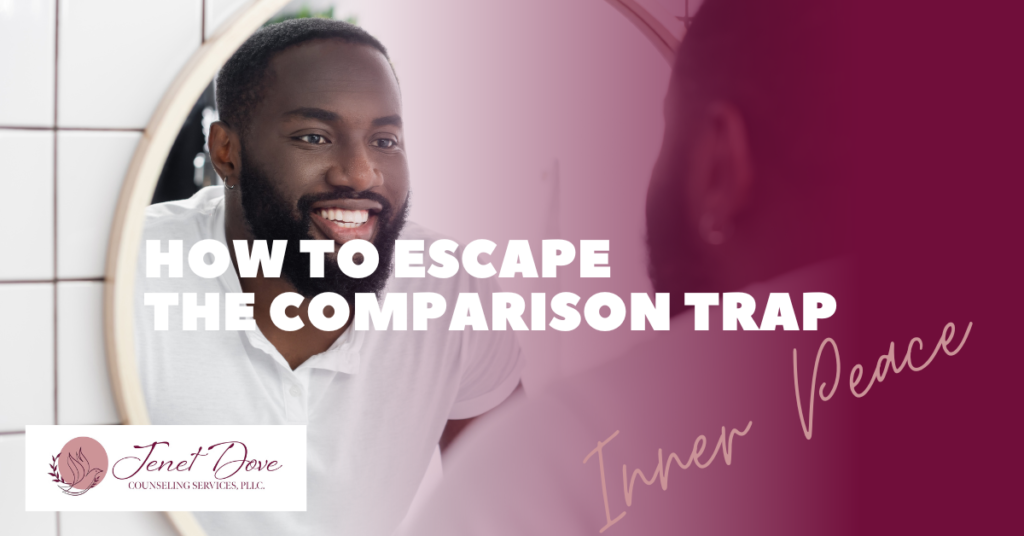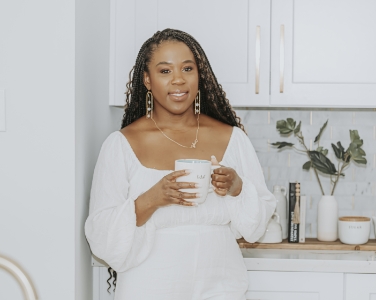Have you ever mindlessly scrolled through social media after a long day of work and stumbled upon a post from a colleague or a friend who is celebrating a major life achievement or showing off their weight loss on a beautiful beach? What were your observations as you looked through the numerous likes and comments? Did you start to compare yourself unfavorably to them and wish you could have their life? If so, you’re not alone. In the digital age, it can be all too easy to fall into the trap of comparison, which in turn often evokes feelings of insecurity and inferiority. Nowhere is this more true than in 2023, when social media has become an even more pervasive part of our lives.
But there’s good news: it is possible to break free from the comparison trap and find inner peace. In this post, we’ll explore what the comparison trap is, why it’s harmful, and the steps needed to break free from its power.
What is the Comparison Trap
The concept of the “Comparison Trap” has been discussed by many professionals in mental health. Fundamentally, it refers to the tendency to compare oneself unfavorably to others based on factors such as appearance, success, wealth, or social status. This can lead to feelings of inadequacy, low self-esteem, and a sense of being “behind” or “not good enough.”
So how can we heal from this? This may sound easier said than done, but by acknowledging who we are with pride, we can begin to truly appreciate our strengths rather than wasting energy constantly trying to measure up.
Here are some strategies that can help us break free from the comparison trap:
Cultivate Conscious Awareness
Cultivating mindfulness through meditation can help you observe your feelings and thoughts without judgment. This technique is particularly useful when trying to detect counterproductive self-talk. To start, allocate a few minutes each day for this practice. Try doing short increments of five minutes of meditation at a time and then gradually increase the duration as it becomes more convenient.
Reframe Negative Thoughts
When you catch yourself comparing yourself unfavorably to someone else, try reframing your thoughts. Instead of focusing on what they have that you don’t, think about what makes you unique and special.
For example: instead of saying, “I wish I had her job,” why not say, “I’m grateful for my job because it allows me to have flexibility, and that’s important for my life right now.” Or instead of saying, “I wish I was as confident as her,” you could try substituting that thought with the statement, “I’m working on building up my self-confidence, and I’m appreciative of the journey.”
Cultivate Gratitude
Practicing gratitude shifts your focus away from what’s lacking in your life and towards things that bring you joy and fulfillment.
Take time each day for intentional reflection; try writing down three things that you’re grateful for every day in your journal as you end your day. Or in the morning, look in the mirror and find three things about yourself that you’re grateful for and say them out loud.
Understand the Oppressive Systems That Cause Us to Compare Ourselves
Understand that oppressive systems like capitalism, racism, and patriarchy are particularly responsible for why we compare ourselves to others. The construction of these systems fosters an atmosphere that encourages competition, binary beauty standards, a selfish attitude, and the idea that success is solely determined by individual power or financial stability.
Acknowledge how these societal frameworks have impacted your understanding of success and beauty, and be kind to yourself if you discover that you don’t fit within these fabricated standards. Don’t forget that many people feel the same way as you do, and you are not alone!
Limit Social Media Use
Social media platforms can create an atmosphere where comparisons run rampant. Especially when looking at images that can be modified with Facetune or AI, and algorithms designed to keep us emotionally engaged, for better or for worse. Be intentional about your time on social media. Try your best to limit usage by scheduling specific times during the day to check feeds rather than constantly monitoring throughout the day.
Remember that people often present the best version of themselves online, and often we’re not privy to what’s going on behind the scenes. Behind every perfectly curated post, there are trails of hard work, self-doubt, and imperfections. So let’s be kind to ourselves and others and remember that it’s okay to not have everything figured out all the time.
The Role Of Race And Body Image In The Comparison Trap
Comparing yourself to others can have a particularly damaging impact when discussing matters related to race and physical appearance. For example, even in my own life, I’ve observed individuals from diverse backgrounds feeling pressure to mimic mainstream beauty standards that do not reflect their own cultural values, and I’ve seen firsthand how that has resulted in feelings of insecurity, self-doubt, detachment, and confusion.
To illustrate this further, let’s look at some examples
- A South Asian female may feel the weight of societal norms to lighten her skin to fit in with Western beauty standards.
- An African American male might experience pressure to comply with conventional masculine ideals that emphasize toxic masculinity and dominance which goes against his own values and interests.
This stress can cause feelings of confusion, and it amplifies discrimination that pushes aside people of different ethnicities and backgrounds.
If this is an issue you’re facing, I want to reassure you that all body types, skin tones, textures, and identities are valid and worthy of love and respect. My ultimate suggestion is to unfollow any social media accounts that make you feel inadequate or less than and detach yourself from people who are forcing you into these boxes. Find communities that feel safe, affirm your dynamic nuances, and make you feel seen for who you are, 100 percent human.
Conclusion
With these tips, I encourage you to appreciate what you have, be content with your accomplishments, and practice radical self-acceptance rather than comparison. Focus on what brings you joy and fulfillment-regardless of societal norms-and embrace your unique qualities. That is how we can cultivate lasting happiness in our lives, and by boldly accepting ourselves, we are ultimately giving others the freedom and permission to do the same.
If you need help on your journey don’t hesitate to reach out below! At Jenet Dove Counseling Services, we’re here to support you!








